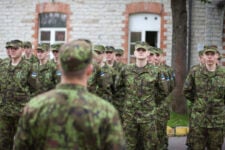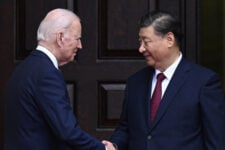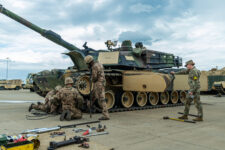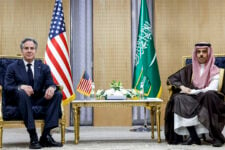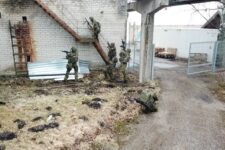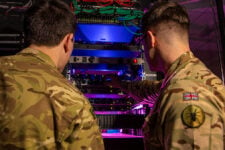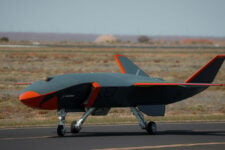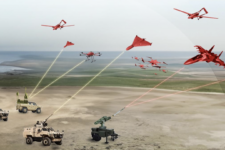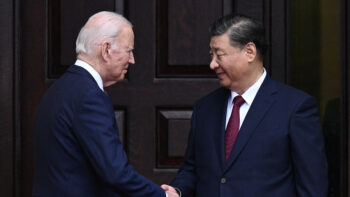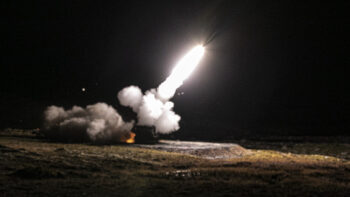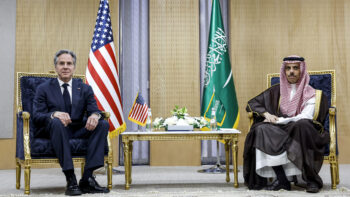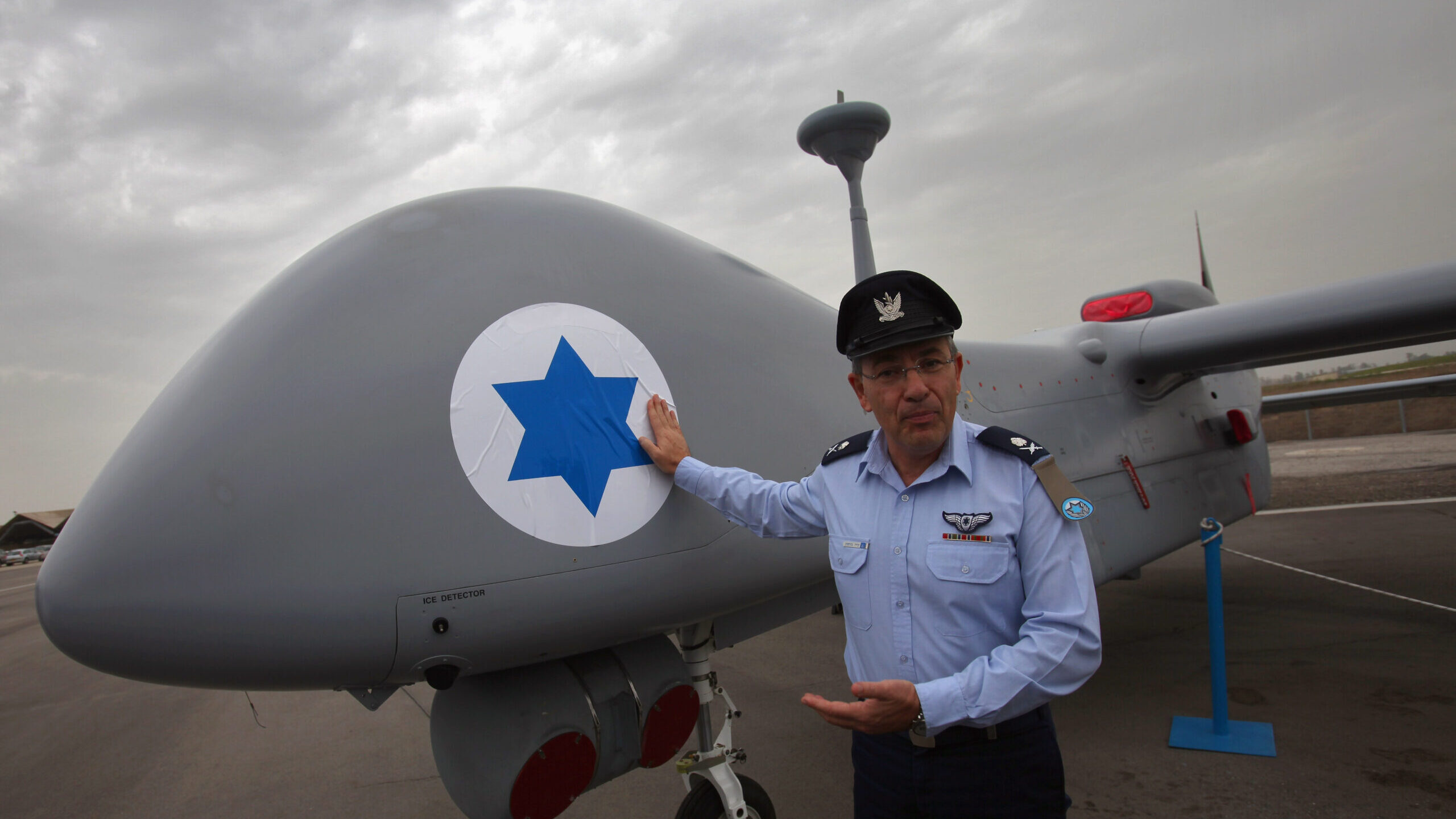
Former Israeli Air Force chief Ido Nehushtan poases with Israel’s Eitan drone in a file photo. (David Silverman/Getty Images)
TEL AVIV: As top military officials from oil-rich Middle Eastern nations gather at the Dubai Air Show next week, some unexpected high-end sellers will be showing off their wares: major Israeli defense firms.
In the wake of the signing of the 2020 Abraham Accords, which normalized relations between Israel, the United Arab Emirates, and Bahrain, Israeli firms see a lucrative opening in the Gulf arms market. The only thing that’s slowing them down is that the accords are still in a probationary period, and the Israeli government appears to be cautious about selling military wares to its former rivals — potentially later even including Saudi Arabia.
“The special plates prepared in the Israeli kitchen are causing big appetites in some Gulf states, but the distance the waiter has to cross with the plates in his hands is still partially blocked,” one senior defense source told Breaking Defense.
As the US “re-positions” major defense systems and reduces troop numbers throughout the Middle East, it’s leaving an arms vacuum that could be a potentially large market for Israeli firms, according to Israeli sources.
They still, however, face local hurdles as the firms prod the Israeli ministry of defense to hurry their pace of approval, according to senior sources here. The sources, who spoke to Breaking Defense on the condition of anonymity, said the slow pace was not as a result of an effort to appease Washington, despite rumors to the contrary.
The issue has been deliberated in recent weeks in the ministry of defense and at the top management of the defense industry firms. Industry officials have already made contacts in the UAE, Bahrain, and even Saudi Arabia. Saudi Arabia was not party to the Abraham Accords, but has indicated it too is inching closer to working with the Israelis on defense.
RELATED: Saudi Arabia considering Israeli-made missile defense systems
But at this stage the Israeli defense ministry has approved only a small portion of the potential deals Israeli defense companies initiated in the Gulf States that have normalized relations with Israel.
Officials with the ministry did not comment for this report, but sources close to the issue told Breaking Defense that the policy is to “move slowly and study any possible implications” of the deals.
Israeli companies have sold defense systems to countries like the UAE and Bahrain even before the Abraham Accords, but those were mainly in the homeland security and cyber categories. Immediately after the accords were signed, the UAE and Bahrain requested to purchase more defense systems.
The Middle East market is massive for defense firms. The US government reported that it approved nearly $2 billion in defense sales to Saudi Arabia in 2020 alone. Just over $1 billion was approved for the UAE, based on federal data.
This year, the Dubai Air Show provides an opening for Israeli firms hoping to get in on the defense action, if and when it’s allowed, and afford them the opportunity to promote non-defense services in the meantime.
RELATED: Israel to request America’s new GBU-72 bunker buster bomb
Israel’s largest defense contractor, Israel Aerospace Industries (IAI), plans to present its capabilities in ground and air combat. IAI sources said the company plans to extend its strategic collaboration in the region by signing new cooperation agreements with local companies and broadening existing partnerships signed in the past year, like with an agreement on cargo conversions with the UAE’s Etihad Engineering.
“These agreements opened a window for extensive cooperation and knowledge, for the promotion of investments, for the development and citizenship of common technologies in the security and civilian spheres,” IAI president and CEO Boaz Levy said.
Rafael, another Israeli defense contractor, will show off its military-oriented systems including AI-assisted aerial defenses, but it too will focus on existing regional partnerships like its joint venture with the UAE technology firm G42, which deals in AI and machine learning.
Rafael’s president and CEO, Yoav Har-Even, told Breaking Defense his firm values regional partnerships when it’s in accordance with the interests of the Israeli defense ministry.
“We are going to be highlighting an array of systems to address a number of evolving threats and they will be exhibited at the Dubai Air Show for the first time, which provides an examples of these opportunities taking shape,” he said. “The exhibition will showcase Rafael’s most advanced systems which have been incorporated by many customers and partners worldwide. We are excited by what the future holds.”
The technology firm Elbit systems will be at the show as well, showing off its solutions for multi-domain networked warfare — a current obsession of the Pentagon’s as well — along with various airborne-related systems.
Ran Kril, Elbit’s executive vice president for international marketing, noted that since the Abraham Accords, the Gulf nations are “important new markets” for his firm.
“We believe that our broad portfolio of solutions together with our proven track record of building local industrial and technological activities in a range of countries position us well to address the needs and opportunities in this region,” Krill said.
Other smaller countries will also be at the show, hoping to snatch a piece of the new market pie. But in the end, how much of a pie there is will depend on the Israeli defense ministry.
“We think that at least some of our systems can be immediately approved for export to these countries, but deals will be signed only if the Israeli ministry of defense give us the freedom to offer and negotiate,” one company official said.
